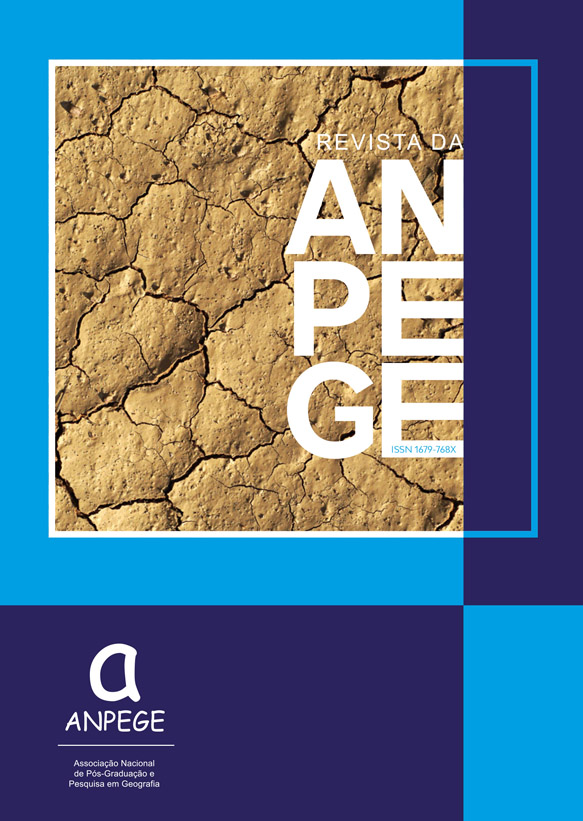Soberania, poder e território: O caso do Sudeste Asiático
DOI:
https://doi.org/10.5418/ra2020.v17i30.10611Palavras-chave:
Sudeste Asiático, Poder, Soberania, TerritórioResumo
As transformações multifacetadas advindas da globalização trouxeram inovações significativas para as interações espaciais, redes e conflitos que incidem sobre a organização multiescalar do espaço, incidindo sobre as relações entre os poderes político, econômico e estratégico com o território. A suposta inexorabilidade do processo de inserção dos Estados e territórios no contexto de globalização, no entanto, mostra-se tênue quando defrontada pelas resistências de diversos atores. A Associação de Nações do Sudeste Asiático (ASEAN) representa um caso emblemático dessa resistência, ao continuar, em larga medida, fundamentada pelo princípio da não intervenção em assuntos internos e pela não adesão à voga de relativização das soberanias. A perenidade desses princípios, em uma comunidade internacional cada vez mais interdependente, na qual a porosidade das fronteiras e a fluidez de pessoas, bens, serviços e capitais constituem a tônica do mundo globalizado, constitui um importante baluarte da manutenção de determinadas formas de poder expressas no território.
Downloads
Referências
ACHARYA, Amitav. Collective identity and conflict management in Southeast Asia. In: ADLER, Emanuel; BARNETT, Michael; SMITH, Steve (Ed.). Security communities, p. 198-227, Cambridge University Press, 1998. DOI: https://doi.org/10.1017/CBO9780511598661.006
____________. The making of Southeast Asia: International relations of a region. Cornell University Press, 2013.
AGNEW, John. The territorial trap: the geographical assumptions of international relations theory. Review of international political economy, v. 1, n. 1, p. 53-80, 1994. DOI: https://doi.org/10.1080/09692299408434268
____________. Sovereignty regimes: territoriality and state authority in contemporary world politics. Annals of the Association of American Geographers, v. 95, n. 2, p. 437-461, 2005. DOI: https://doi.org/10.1111/j.1467-8306.2005.00468.x
____________. Globalization and sovereignty. Rowman & Littlefield Publishers, 2009
ASEAN. Treaty of Amity and Cooperation in Southeast Asia. Jakarta: ASEAN Secretariat, 1976. Disponível em: <https://asean.org/treaty-amity-cooperation-southeast-asia-indonesia-24-february-1976>. Acesso em 22.Out.2019.
COSTA, Wanderley Messias da. Geografia Política: discursos sobre o território e o poder. São Paulo: Editora da Universidade de São Paulo, 2013.
DALBY, Simon. Geopolitics, knowledge and power at the end of the century. In: DALBY, Simon; ROUTLEDGE, Paul; TUATHAIL, Gearóid Ó. The geopolitics reader. Routledge, 1998.
GOTTMAN, Jean. A evolução do conceito de território. Boletim Campineiro de Geografia, v.2, n.3, p.523-545, 2012. DOI: https://doi.org/10.54446/bcg.v2i3.86
JAYAKUMAR, Shunmugam. Opening Statement’, 30th ASEAN Ministerial Meeting, Subang Jaya, 24 May, 1997. Disponível em: < https://asean.org/?static_post=opening-statement-by-he-professor-sjayakumar-minister-for-foreign-affairs-of-singapore >. Acesso em: 29.Out.2019.
JETSCHKE, Anja; KATADA, Saori N. Asia. In: BÖRZEL, Tanja A.; RISSE, Thomas (Ed.). The Oxford Handbook of Comparative Regionalism. Oxford University Press, p. 408-450, 2016.
JONES, Lee. ASEAN's unchanged melody? The theory and practice of ‘non-interference’in Southeast Asia. The Pacific Review, v.23, n.4, p.479-502, 2010. DOI: https://doi.org/10.1080/09512748.2010.495996
KISSINGER, Henry. Ordem Mundial. Editora Objetiva, 2015.
OISHI, Mikio. Introduction: The ASEAN Way of conflict management under challenge. Contemporary Conflicts in Southeast Asia. Springer, Singapore, 2016. p. 1-17. DOI: https://doi.org/10.1007/978-981-10-0042-3_1
RAFFESTIN, Claude. Por uma geografia do poder; tradução: Maria Cecília França. São Paulo: Ática, 1993.
RÜLAND, Jürgen. Coping with crisis: Southeast Asian regionalism and the ideational constraints of reform. Asia Europe Journal, v. 16, n. 2, p. 155-168, 2018. DOI: https://doi.org/10.1007/s10308-018-0503-z
SANTOS, Milton. A natureza do espaço: técnica e tempo – razão e emoção. São Paulo: Hucitec, 2004.
STUBBS, Richard. The ASEAN alternative? Ideas, institutions and the challenge to ‘global’ governance. The Pacific Review, v. 21, n. 4, p. 451-468, 2008. DOI: https://doi.org/10.1080/09512740802294713
TUATHAIL, Gearóid Ó. The postmodern geopolitical condition: states, statecraft, and security at the millennium. Annals of the Association of American Geographers, v. 90, n. 1, p. 166-178, 2000. DOI: https://doi.org/10.1111/0004-5608.00192
Downloads
Publicado
Como Citar
Edição
Seção
Licença
Autores que publicam nesta revista concordam com os seguintes termos:Autores mantêm os direitos autorais e concedem à revista o direito de primeira publicação, com o trabalho simultaneamente licenciado sob a Creative Commons Atribuição-NãoComercial-CompartilhaIgual 3.0 Brasil que permitindo o compartilhamento do trabalho com reconhecimento da autoria do trabalho e publicação inicial nesta revista.
Autores têm autorização para assumir contratos adicionais separadamente, para distribuição não exclusiva da versão do trabalho publicada nesta revista (ex.: publicar em repositório institucional ou como capítulo de livro), com reconhecimento de autoria e publicação inicial nesta revista.
Autores têm permissão e são estimulados a publicar e distribuir seu trabalho online (ex.: em repositórios institucionais ou na sua página pessoal) a qualquer ponto antes ou durante o processo editorial, já que isso pode gerar alterações produtivas, bem como aumentar o impacto e a citação do trabalho publicado (Veja O Efeito do Acesso Livre em http://opcit.eprints.org/oacitation-biblio.html.)
Authors who publish with this journal agree to the following terms:
Authors retain copyrights and grant the Journal the right of first publication with the work simultaneously licensed under a Creative Commons Atribuição-NãoComercial-CompartilhaIgual 3.0 Brasil that allows others to share the work with an acknowledgement of the work's authorship and initial publication in this Journal.
Authors are permitted to enter into separate, additional contractual arrangements for the non-exclusive distribution of the Journal's published version of the work (e.g., post it to an institutional repository or in a book chapter), with an acknowledgement of authorship and initial publication in this journal.
Authors are permitted and encouraged to publish and share their work online (e.g., in institutional repositories or on their website) prior to and during the submission process, as it can lead to productive exchanges, as well as increase the impact and citation of published work (See The Effect of Open Access - http://opcit.eprints.org/oacitation-biblio.html.)




